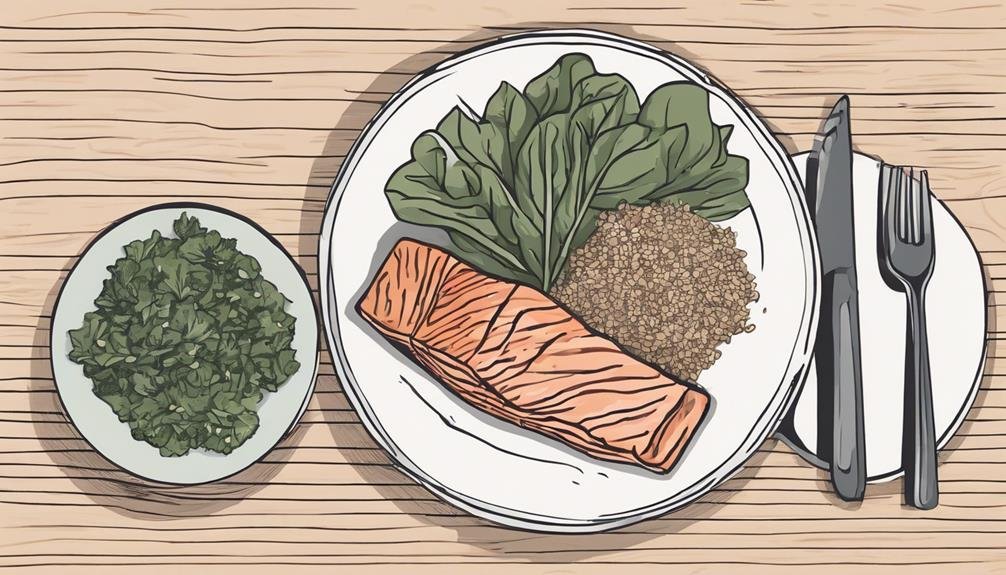7 Tips: Nourish Aging Male Bones for Lifelong Health
To nourish your aging bones for lifelong health, start by prioritizing calcium intake and guarantee you get enough vitamin D through diet or sunlight. Incorporate lean protein in every meal to support muscle mass and reduce fracture risk. Staying hydrated is essential, so aim for at least eight cups of water daily. Don't forget healthy fats from sources like avocados and nuts, while limiting processed sugars that could harm bone density. Finally, maintain balanced meals packed with a variety of nutrients. There's more to learn about each tip that can help strengthen your bones as you age.
Key Takeaways
- Prioritize calcium intake by consuming dairy, leafy greens, and fortified foods to maintain bone density and strength.
- Incorporate vitamin D sources like fatty fish and sunlight exposure to enhance calcium absorption for optimal bone health.
- Embrace lean protein in every meal from sources like chicken, fish, and beans to support muscle mass and reduce fracture risk.
- Stay hydrated by drinking at least 8 cups of water daily and including hydrating foods to support joint lubrication and nutrient transport.
Prioritize Calcium Intake
To maintain strong bones as you age, you should prioritize calcium intake in your daily diet. Calcium is essential for bone density and strength, especially as your body naturally loses bone mass over time.
Aim for at least 1,000 mg of calcium daily, increasing to 1,200 mg after age 70. Incorporate calcium-rich foods like dairy products, leafy greens, and fortified plant-based alternatives.
If you struggle to meet your needs through food alone, consider a supplement after consulting your healthcare provider. Regularly monitor your calcium levels and adjust your intake accordingly.
Staying active with weight-bearing exercises also supports your bone health, but remember: without sufficient calcium, those efforts mightn't be as effective.
Prioritize your nutrition to safeguard your bones!
Incorporate Vitamin D Sources

Incorporating vitamin D sources into your diet is essential for enhancing calcium absorption and supporting overall bone health. You can obtain vitamin D through a variety of means.
Fatty fish like salmon and mackerel are excellent options, as are fortified foods like milk and cereals. Egg yolks also provide a good source.
If you're not getting enough from food, consider spending time outdoors; sunlight naturally helps your body produce vitamin D. If you struggle to meet your needs through diet and sunlight, a supplement might be beneficial.
Talk to your healthcare provider about the right dosage for you. By focusing on these sources, you'll help strengthen your bones and maintain their health as you age.
Embrace Lean Protein
Alongside vitamin D, embracing lean protein in your diet plays an essential role in maintaining strong bones as you age.
Lean protein sources, like chicken, fish, beans, and low-fat dairy, provide the amino acids necessary for bone health and repair. They help in building and preserving muscle mass, which supports your bones and reduces the risk of fractures.
Aim for a balanced intake, with protein included in every meal. This can enhance your overall nutrition and bone density.
Don't forget to vary your protein sources to maximize nutrient intake.
Stay Hydrated Daily

Staying hydrated daily is essential for maintaining bone health, as water supports nutrient transport and helps keep your joints lubricated.
Dehydration can lead to joint pain and stiffness, which may impact your mobility and overall well-being.
To guarantee you're drinking enough water, consider these tips:
- Set a daily water goal: Aim for at least 8 cups of water each day, adjusting for activity level and climate.
- Carry a reusable water bottle: Keep it with you to remind yourself to sip throughout the day.
- Include hydrating foods: Incorporate fruits and vegetables like cucumbers, watermelon, and oranges, which can contribute to your hydration levels.
Include Healthy Fats
Healthy fats play an essential role in supporting bone health and can be easily added to your diet alongside proper hydration.
Incorporating sources like avocados, nuts, seeds, and olive oil can help you maintain healthy bones as you age. These fats not only provide energy but also assist in the absorption of fat-soluble vitamins, which are vital for bone density.
Omega-3 fatty acids, found in fatty fish like salmon and mackerel, can reduce inflammation and support overall bone health.
Aim to replace saturated fats with these healthier options to improve your nutritional intake.
Limit Processed Sugars

Limiting processed sugars is essential for maintaining strong bones as you age. High sugar intake can lead to inflammation, which negatively impacts bone health. By reducing your sugar consumption, you can help preserve your bone density and overall well-being.
Here are three effective strategies to limit processed sugars:
- Read Labels: Always check food labels for added sugars. You might be surprised by how much is hidden in everyday products.
- Choose Whole Foods: Opt for fresh fruits, vegetables, and whole grains instead of sugary snacks and processed foods.
- Stay Hydrated: Drink water or herbal teas instead of sugary beverages like soda and energy drinks.
Maintain Balanced Meals

A well-balanced meal provides essential nutrients that support bone health and overall vigor as you age. To maintain strong bones, focus on incorporating a variety of food groups in your diet. Aim for meals rich in calcium, vitamin D, and protein, which play significant roles in bone density and strength.
Here's a simple guide to help you plan balanced meals:
| Food Group | Examples | Nutrients |
|---|---|---|
| Dairy | Milk, Yogurt | Calcium, Vitamin D |
| Proteins | Chicken, Fish | Protein |
| Vegetables | Broccoli, Spinach | Vitamins, Minerals |
Questions
What Specific Foods Are Highest in Calcium for Men?
To boost your calcium intake, focus on foods like dairy products, leafy greens, almonds, and fortified plant-based milks. Incorporating sardines and tofu into your meals also helps guarantee you're meeting your calcium needs effectively.
How Does Exercise Impact Bone Health in Aging Males?
Did you know that weight-bearing exercises can increase bone density by up to 1% annually? Regular workouts, like walking or resistance training, strengthen your bones, helping you maintain health and reduce fracture risk as you age.
Can Supplements Replace Dietary Calcium and Vitamin D?
Supplements can't fully replace dietary calcium and vitamin D. While they help, whole foods provide additional nutrients and benefits. You should aim for a balanced diet to support your overall health and bone strength effectively.
What Are the Signs of Bone Health Issues to Watch For?
When bones whisper troubles, listen closely. You should watch for persistent aches, increased fractures, decreased strength, or height loss. If you notice these signs, it's time to consult a healthcare professional for a thorough evaluation.
How Often Should Bone Density Tests Be Done for Men?
You should get a bone density test every two years if you're at risk for osteoporosis. If you've already been diagnosed, your doctor might recommend more frequent testing to monitor your bone health effectively.
Conclusion
By prioritizing calcium, incorporating vitamin D, and embracing lean protein, you're building a strong foundation for your bones.
Imagine each meal as a building block, stacking healthy fats and hydration to create a sturdy structure.
Limiting processed sugars is like removing weak links from your design, ensuring longevity.
When you maintain balanced meals, you're painting a vibrant picture of health.
Together, these steps help you nourish your aging bones for a lifetime of strength and energy.

